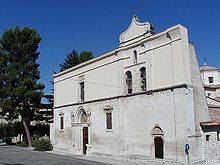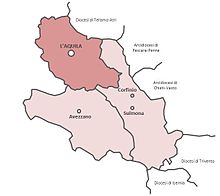Roman Catholic Diocese of Sulmona-Valva
Diocese of Sulmona-Valva Dioecesis Sulmonensis-Valvensis | |
|---|---|
 Sulmona Cathedral | |
| Location | |
| Country | Italy |
| Ecclesiastical province | L'Aquila |
| Statistics | |
| Area | 1,814 km2 (700 sq mi) |
| Population - Total - Catholics | (as of 2014) 85,000 81,058 (98.1%) |
| Parishes | 76 |
| Information | |
| Denomination | Catholic Church |
| Rite | Roman Rite |
| Established | 6th Century |
| Cathedral | Basilica Cattedrale di S. Panfilo Vescovo (Sulmona) |
| Co-cathedral | Concattedrale di S. Pelino (Corfinio) |
| Patron saint | Saint Panfilo |
| Secular priests | 80 |
| Current leadership | |
| Pope | Francis |
| Bishop | Michele Fusco |
| Emeritus Bishops | Giuseppe Di Falco |
| Map | |
 | |
| Website | |
| www.diocesisulmona-valva.it | |
The Diocese of Sulmona-Valva (Latin: Dioecesis Sulmonensis-Valvensis) is a Roman Catholic ecclesiastical territory in central Italy, created in 1986. It is a suffragan of the Archdiocese of L'Aquila. The diocese was created in 1818 when the Diocese of Sulmona and the Diocese of Valva were united.[1][2]
Contents
1 History
2 List of bishops
3 Notes
4 Sources
History
In the Lombard period Sulmona was subject to the Duchy of Spoleto; later it belonged to the counts of the Marsi. When the Normans conquered the Abruzzi, Sulmona increased in importance. Emperor Frederick II made it the capital of the "Gran Giustizierato" of the Abruzzi.
Legend associates the evangelization of the district with the name of Saint Britius, Bishop of Spoleto, in the second century. The first known Bishop of Sulmona is Palladius (499); in 503 a Fortunatus Valvensis is mentioned. Saint Pamphilus, Bishop of Valva, renowned for his sanctity and miracles, died about 706; he was buried in Sulmona Cathedral.
Four or five other bishops of Valva are known, but none of Sulmona until 1054, when Pope Leo IX named as Bishop of Valva, the Benedictine Domenico, and determined the limits of the Dioceses of San Pelino (Saint Pelinus) (i.e., Valva) and San Panfilo (Saint Pamphilus) (i.e., Sulmona), which were to have only one bishop, elected by the two chapters. Under Bishop Giacomo di Penne, a monk of Casa Nova (1252), it was arranged that the two chapters should unite in making the election, as frequent disputes had arisen when they acted separately.
Other bishops were: Bartolomeo of Tocco (1402), esteemed for his learning by Pope Innocent VII, who gave him his own mitre; Donato Bottini (1448), an Augustinian; Pompeo Zambeccari (1547), nuncio in Poland; Francesco Bonapaduli (1638); Pietro Antonio Corsignani (17380, the historian of the Abruzzi.
During the dispute between the Holy See and the Kingdom of Naples the see remained vacant from 1800 till 1818.[3]
List of bishops
Postnominal initials:
Benedictine = OSB,
Dominican = OP,
Cistercian = OCist,
Franciscan = OFM,
Minorite = OFMC,
Augustinian = OESA,
Oratorian = CO,
Olivetan = OSBOliv
- Geruntius (mentioned in 494/495), bishop of Valva
- Palladius (mentioned in 499), bishop of Sulmona
- Fortunatus (mentioned in 502), possibly bishop of Valva[4]
Pamphilus (mentioned in 682), bishop of Sulmona- Gradescus (mentioned in 701), bishop of Sulmona
- Vadpert (mentioned in 775)
- Ravennus (mentioned in 840)
- Arnold (mentioned in 843)
- Opitarmo (mentioned in 880)
- Grimoald (mentioned in 968)
- Theodulf (mentioned in 1010)
- Transeric (mentioned in 1030)
- Suabilo (mentioned in 1042)
- Dominic OSB (1053–1073)
- Transmund (1073–1080), dismissed
- John (1092–1104)
- Walter (1104–1124)
- Odo (I) (1130–1140)
- Gerald (1143–1146)
- Siginulf (1146–1168)
- Oderisius of Raino (1172–1193)
- William (I) (1194–1206)
- Odo (II) (1206 – before 6 May 1226)
- Berard (1226–1227), elected but never confirmed
- Nicholas (1227–1247)
- Walter of Ocra (3 October[5] 1247 – 1249)
- James (I) OCist (1249–1251?)
- James (II) OP (10 April 1252 – 1263)
- According to Pius Bonifacius Gams,[citation needed] there were two bishops named James, a Cistercian and then a Dominican. According to Konrad Eubel, there was only one, a Cistercian elected on 10 April 1252 and who died in 1263.
- James (III) of Orvieto OP (6 March 1263 – after 1273)
- Giles of Liège OFM (25 February 1279 – 1290), dismissed
- William (II) OSB (28 August 1291 – ????)
- Pietro dell'Aquila OSB (1294 – 18 September 1294) elected but never confirmed
- Federico Raimondo de Letto (30 March 1295 – 1307)
- Landulf I (4 June 1307 – 1319)
- Andrea Capograssi (25 May 1319 – 1330)
- Pietro di Anversa OFM (4 May 1330 – 1333)
- Nicolò di Pietro Rainaldi (30 October 1333 – 1343)
- Francesco di Sangro (12 February 1343 – 1348)
- Landulf II (2 July 1348 – 1349)
- Francesco de Silanis OFM (17 January 1350 – ????)
- Martino de Martinis (14 April 1368 – ????)
- Roberto de Illice (18 April 1379 – 2 July 1382), anti-bishop, became Archbishop of Salerno
- Roberto de Illice (18 April 1379 – 2 July 1382), anti-bishop, became Archbishop of Salerno
- Paolo da Letto (around 1379 – ????)
- Nicola de Cervario OFM (2 July 1382 – 4 June 1397), anti-bishop, became Bishop of Digne
- Nicola de Cervario OFM (2 July 1382 – 4 June 1397), anti-bishop, became Bishop of Digne
- Bartolomeo Gaspare (1384–????)
- Bartolomeo Petrini (1402–1419)
- Lotto Sardi (6 March 1420 – 21 May 1427), became Archbishop of Spoleto
- Benedetto Guidalotti (21 May 1427 – 29 October 1427), became Bishop of Teramo
- Bartolomeo Vinci (29 October 1427 – December 1442)
- Francesco de Oliveto OSB (12 August 1443 – 14 June 1447), became Bishop of Rapolla
- Pietro d'Aristotile (14 June 1447 – 1448)
- Donato Bottino OESA (4 September 1448 – 1463)
- Bartolomeo Scala OP (3 October 1463 – 1491)
- Giovanni Melini Gagliardi (7 November 1491 – 1499)
- Giovanni Acuti (1499–1512)
Andrea della Valle (1512–1512), apostolic administrator
- Prospero de Rusticis (3 March 1512[6] – 1514), dismissed
- Giovanni Battista Cavicchio (28 July 1514 – 1519)
Andrea della Valle (26 October 1519 – 1521), apostolic administrator[7]
Alessandro Farnese (1521–1521), apostolic administrator, became Pope
- Cristóbal de los Ríos (18 June 1521 – 1523)
- Orazio della Valle (17 July 1523 – 1528)
- Francisco de Lerma (14 August 1528 – ????)
- Bernardo Cavalieri delle Milizie (3 September 1529 – 1532)
- Bernardino Fumarelli (13 November 1532 – 5 June 1547)
- Pompeo Zambeccari (1 July 1547 – 8 August 1571)
Vincenzo de Doncelli OP (24 September 1571 – 1585)[8]
Francesco Caruso OFMC (13 March or 13 May 1585 – 4 September 1593)- Cesare del Pezzo (24 November 1593 – 23 April 1621)[9]
Francesco Cavalieri (21 July 1621 – 4 September 1637)[9]
Francesco Boccapaduli (13 September 1638 – 6 May 1647), became Bishop of Città di Castello[9][10]
Alessandro Masi (27 May 1647 – 12 September 1648)[9]
- Francesco Carducci (22 March 1649 – 5 November 1654)[9]
- Gregorio Carducci (14 June 1655 – 15 January 1701)[9]
- Bonaventura Martinelli (21 November 1701–August 1715)
Francesco Onofrio Hodierna (4 January 1717 – 17 March 1727), dismissed[11][12]
- Matteo Odierna OSBOliv (17 March 1727 – June 1735)
- Pietro Antonio Corsignani (23 July 1738 – 17 October 1751)
- Carlo De Ciocchis (24 January 1752 – 10 September 1762), dismissed
- Filippo Paini (22 November 1762 – 1799)
- Sede vacante (1799–1818)
- Felice Tiberi CO (6 April 1818 – 22 April 1829)
- Giuseppe Maria Deletto (27 July 1829 – 10 November 1839)
- Mario Mirone (27 April 1840 – 27 June 1853), became Bishop of Noto
- Giovanni Sabatini (27 June 1853 – 10 March 1861)
- Sede vacante (1861–1871)
- Tobia Patroni (22 December 1871 – 20 August 1906)
- Nicola Jezzoni (6 December 1906 – 18 July 1936), retired
- Luciano Marcante (14 March 1937 – 29 January 1972), retired
- Francesco Amadio (29 January 1972 – 14 May 1980), became Bishop of Rieti
- Salvatore Delogu (8 January 1981 – 25 May 1985), dismissed
- Giuseppe Di Falco (25 May 1985 – 3 April 2007), retired
- Angelo Spina (3 April 2007 – 14 July 2017), became Arcibishop of Ancona-Osimo
- Michele Fusco (30 November 2017 -
Notes
^ "Diocese of Sulmona-Valva" Catholic-Hierarchy.org. David M. Cheney. Retrieved February 29, 2016
^ "Diocese of Sulmona-Valva" GCatholic.org. Gabriel Chow. Retrieved February 29, 2016
^ Catholic Encyclopedia article
^ According to Francesco Lanzoni, none of the three bishops named Fortunatus who took part in the council of Rome in 502 was a bishop of Valva.
^ This date is not certain.
^ According to Eubel,[citation needed] who does not list Giovanni Acuti, Prospero was confirmed on 25 October 1499.
^ "Andrea Cardinal Della Valle" Catholic-Hierarchy.org. David M. Cheney. Retrieved May 16, 2016
^ "Bishop Vincenzo de Doncelli (Donzelli), O.P." Catholic-Hierarchy.org. David M. Cheney. Retrieved March 21, 2016
^ abcdef Gauchat, Patritius (Patrice). HIERARCHIA CATHOLICA MEDII ET RECENTIORIS AEVI Vol IV. p. 152..mw-parser-output cite.citation{font-style:inherit}.mw-parser-output q{quotes:"""""""'""'"}.mw-parser-output code.cs1-code{color:inherit;background:inherit;border:inherit;padding:inherit}.mw-parser-output .cs1-lock-free a{background:url("//upload.wikimedia.org/wikipedia/commons/thumb/6/65/Lock-green.svg/9px-Lock-green.svg.png")no-repeat;background-position:right .1em center}.mw-parser-output .cs1-lock-limited a,.mw-parser-output .cs1-lock-registration a{background:url("//upload.wikimedia.org/wikipedia/commons/thumb/d/d6/Lock-gray-alt-2.svg/9px-Lock-gray-alt-2.svg.png")no-repeat;background-position:right .1em center}.mw-parser-output .cs1-lock-subscription a{background:url("//upload.wikimedia.org/wikipedia/commons/thumb/a/aa/Lock-red-alt-2.svg/9px-Lock-red-alt-2.svg.png")no-repeat;background-position:right .1em center}.mw-parser-output .cs1-subscription,.mw-parser-output .cs1-registration{color:#555}.mw-parser-output .cs1-subscription span,.mw-parser-output .cs1-registration span{border-bottom:1px dotted;cursor:help}.mw-parser-output .cs1-hidden-error{display:none;font-size:100%}.mw-parser-output .cs1-visible-error{font-size:100%}.mw-parser-output .cs1-subscription,.mw-parser-output .cs1-registration,.mw-parser-output .cs1-format{font-size:95%}.mw-parser-output .cs1-kern-left,.mw-parser-output .cs1-kern-wl-left{padding-left:0.2em}.mw-parser-output .cs1-kern-right,.mw-parser-output .cs1-kern-wl-right{padding-right:0.2em}
^ "Archbishop Francesco Boccapaduli" Catholic-Hierarchy.org. David M. Cheney. Retrieved January 20, 2017
^ "Bishop Francesco Onofrio Hodierna" Catholic-Hierarchy.org. David M. Cheney. Retrieved August 21, 2016
^ "Bishop Francesco Onofrio Odierna" GCatholic.org. Gabriel Chow. Retrieved February 29, 2016
Sources
![]() This article incorporates text from a publication now in the public domain: Herbermann, Charles, ed. (1913). "article name needed". Catholic Encyclopedia. New York: Robert Appleton.
This article incorporates text from a publication now in the public domain: Herbermann, Charles, ed. (1913). "article name needed". Catholic Encyclopedia. New York: Robert Appleton.
Coordinates: 42°24′00″N 12°52′00″E / 42.4000°N 12.8667°E / 42.4000; 12.8667